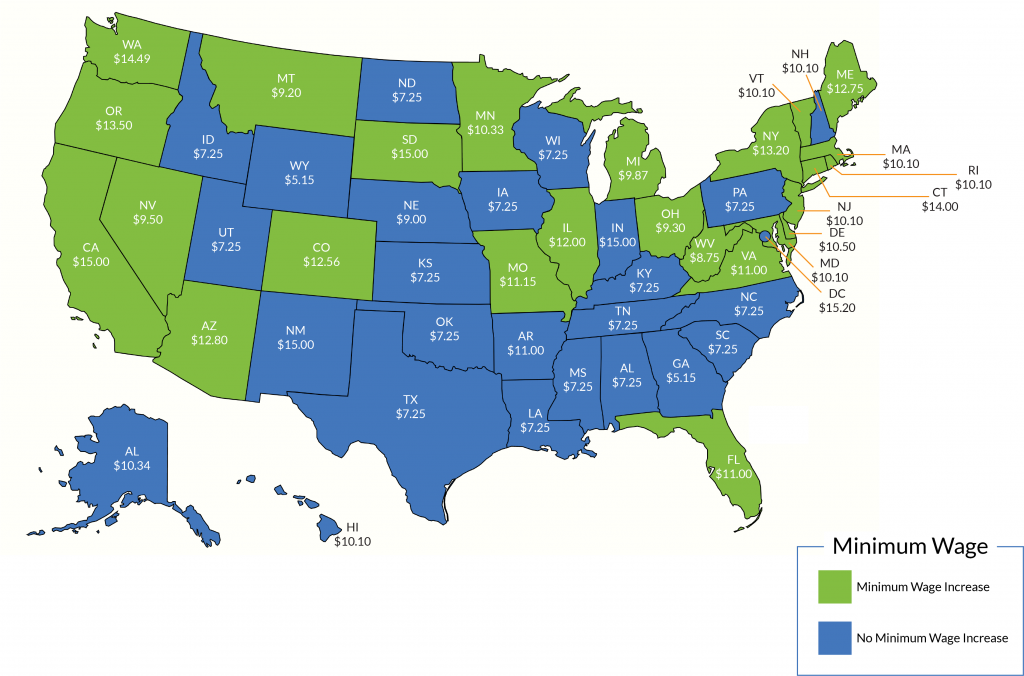As one of the fastest-growing cities in the United States, Nashville, Tennessee has become a hub for music, tourism, and business. However, with this growth comes an increase in the cost of living. Many workers in Nashville struggle to make ends meet on minimum wage salaries. This issue has sparked a debate about whether or not to raise the minimum wage in Nashville. In this article, we will explore the current state of the minimum wage in Nashville, its economic impact, and the pros and cons of raising it. We will also discuss what the future may hold for minimum wage workers in Music City.
The Cost of Living in Nashville
Nashville, Tennessee is a vibrant and growing city that has become a popular destination for tourists and new residents alike. However, with this growth comes an increase in the cost of living. According to recent studies, Nashville’s cost of living is 3% higher than the national average. This means that residents must pay more for housing, groceries, transportation, and other necessities.
Housing is one of the biggest expenses in Nashville. The median home price in Nashville is $279,900, which is significantly higher than the national median home price of $231,000. Renting is also expensive in Nashville with the average rent for a one-bedroom apartment being around $1,200 per month.
In addition to housing costs, other expenses such as food and transportation are also higher in Nashville compared to other cities. Groceries are about 10% more expensive than the national average and gas prices are slightly above average.
Overall, while Nashville offers many opportunities and attractions for its residents, it comes at a higher cost of living. This makes it difficult for low-wage workers to make ends meet without some form of assistance or an increase in their wages.
The Minimum Wage in Nashville
In Nashville, the current minimum wage is set at $7.25 per hour, which is the same as the federal minimum wage. This means that workers in Nashville who earn the minimum wage are making just over $15,000 per year if they work full-time. While this may seem like a livable wage for some, it falls short of what is considered a living wage in Nashville.
Many workers in Nashville struggle to make ends meet on the current minimum wage, especially those who work in low-wage industries such as food service and retail. The cost of living in Nashville has been steadily increasing over the years, with housing costs being one of the biggest expenses for residents. With rent prices skyrocketing and other basic necessities becoming more expensive, many workers are finding it difficult to keep up with their bills and provide for their families on such a low income.
The issue of raising the minimum wage has been a hot topic of debate in Nashville and across the country. Some argue that raising the minimum wage would help lift workers out of poverty and stimulate economic growth by putting more money into consumers’ pockets. Others argue that raising the minimum wage would lead to job losses and hurt small businesses.
Regardless of where one stands on this issue, it’s clear that something needs to be done to address the struggles faced by low-wage workers in Nashville. The current minimum wage simply isn’t enough to provide a decent standard of living for many people in this city.
The Economic Impact of the Minimum Wage
When it comes to the minimum wage, there are many factors to consider. One of the most important is its economic impact. Supporters of raising the minimum wage argue that it would stimulate economic growth by increasing consumer spending and reducing employee turnover. On the other hand, opponents argue that it would lead to job loss and higher prices for consumers.
Studies have shown mixed results on the economic impact of raising the minimum wage. Some studies suggest that it could lead to job loss, particularly among small businesses. However, other studies suggest that any potential job loss would be offset by increased consumer spending and reduced employee turnover.
Ultimately, the economic impact of raising the minimum wage in Nashville will depend on a variety of factors, including the size and composition of the city’s workforce, as well as broader economic trends. As policymakers consider whether or not to raise the minimum wage, they will need to carefully weigh these competing arguments in order to make an informed decision that benefits all members of their community.
The Pros and Cons of Raising the Minimum Wage
When it comes to raising the minimum wage in Nashville, there are both pros and cons to consider. On one hand, increasing the minimum wage can help lift workers out of poverty and reduce income inequality. It can also boost consumer spending as low-wage workers have more money to spend on goods and services.
However, opponents argue that raising the minimum wage could lead to job loss as employers may not be able to afford higher wages for their employees. This could particularly impact small businesses who may struggle with increased labor costs. Additionally, some argue that raising the minimum wage could lead to inflation as businesses pass on the increased costs to consumers.
Ultimately, whether or not to raise the minimum wage in Nashville is a complex issue with valid arguments on both sides. It will require careful consideration and analysis of the potential impacts before any decision is made.
The Future of the Minimum Wage in Nashville
Looking ahead, the future of the minimum wage in Nashville is uncertain. While there are ongoing efforts to raise the minimum wage to $15 per hour, there are also concerns about the potential impact on small businesses and job growth.
Advocates for a higher minimum wage argue that it would help reduce poverty and income inequality, while opponents argue that it could lead to job losses and increased prices for consumers. As Nashville continues to grow and attract new businesses, it will be important for policymakers to carefully consider the potential impacts of any changes to the minimum wage.
Ultimately, the future of the minimum wage in Nashville will depend on a variety of factors, including economic conditions, political priorities, and public opinion. As residents of Nashville, we have an important role to play in shaping this debate and advocating for policies that promote fairness and opportunity for all workers.
Conclusion
In conclusion, the debate over the minimum wage in Nashville is a complex issue with valid arguments on both sides. While raising the minimum wage may provide relief for low-wage workers struggling to make ends meet in an expensive city, it could also have negative economic consequences such as job loss and increased prices for consumers. Ultimately, the decision on whether or not to raise the minimum wage should be based on a thorough analysis of its potential impact on Nashville’s economy and its residents. As Nashville continues to grow and evolve, it will be important for policymakers to carefully consider all factors before making any changes to the minimum wage.



